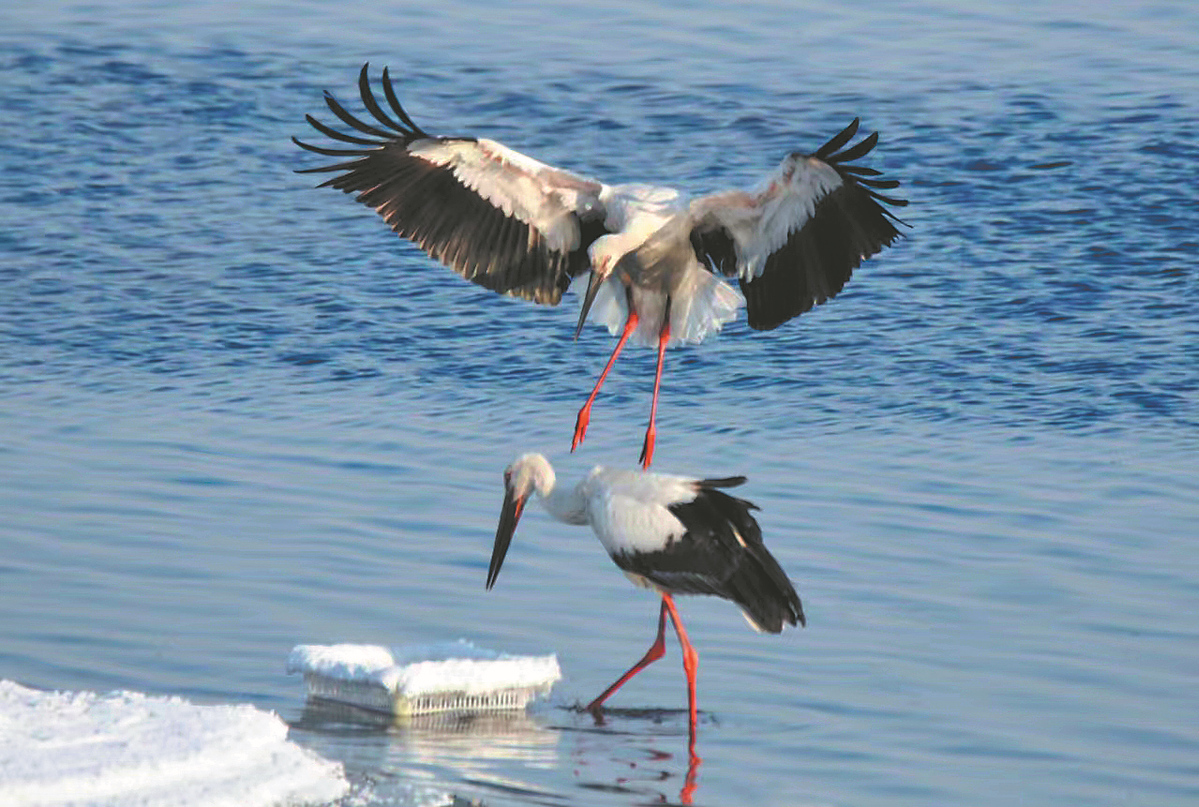Cold brings photographer, feathered friends together
Yang Wei helps critically endangered birds survive harsh winter in Harbin


Feeding troubles
After doing research on the internet and consulting with experts, she learned a lot about the birds.
"Each stork needs about 2 to 4 kilograms of fish every day, and for young storks, the length of fish should be shorter than 10 centimeters," she said. "They don't eat sea fish, so we chose crucian carp to feed them."
However, during winter in Harbin, it's not easy to buy a large quantity of specific types of fish with the right length. Yang and her friends had to visit different markets across the city. "We would scatter the fish at the edge of the flowing water, but I fell into the icy water three times because the thin ice suddenly broke," she said. "Furthermore, when the area with flowing water grew too large, we couldn't get close to the storks."
Yang used devices to help her throw the fish near the storks, and on the occasions when they were further away, she used a drone to carry fish to them.
Because the drone could only carry 0.4 kg of fish at a time, Yang had to repeat the process more than 10 times to feed the birds. The task was especially difficult because of the frigid cold. "Temperatures could drop to nearly — 30 C near the river, and even five batteries weren't enough for the drone to fly back and forth," she said.
Yang also tried other methods, including hiring a boat to get near the storks. "The villager who rowed the boat refused to take money when he found out we wanted to feed the Oriental white storks," she said. "We also received help from the Blue Sky Rescue Team, who used a kayak to scatter over a dozen kilograms of fish along the river."
Staff members from the city's forestry and grassland bureau brought live loaches, which the birds enjoyed. "We reached an agreement to take turns feeding to ensure that the stork babies had sufficient food every day," said Yang. "When the storks discovered that there was an abundant food supply, they settled down peacefully."
A bond of trust was gradually established between the storks and Yang. "Initially, they were skeptical, but eventually, they treated the drone as a dinner bell," she said. "As soon as the drone approached them, they would actively fly over to eat. Later, I could feed them from a distance of 4 or 5 meters, and they were no longer afraid of me."
Saying goodbye
Thanks to Yang and her friends, the two birds survived the severe winter and welcomed the arrival of March, when the ice and snow began to melt and the migratory birds returned from the south.
After disappearing for nearly two weeks, the two birds returned to the river area on March 15, accompanied by an even larger Oriental white stork. On the afternoon of March 19, Yang was astonished to find around 50 Oriental white storks soaring and circling above the river.
Two hours later, the flock departed, along with the two birds. "I was crying and searching for them among the stork flock, forgetting even to take photos," she said. "Despite coming there every day the following week, I haven't seen them again."
On March 23, China News Service reported that the first group of Oriental white storks of the year had arrived at the Honghe National Nature Reserve in Heilongjiang.
"I believe that they must be there," Yang said. "After spending 109 days together, I felt very reluctant to part ways, but more than that, I am happy. This has been a remarkable encounter in my life."
Wu Bingyi, an expert from the city's forestry and grassland bureau, said Yang's experience marked the first time Oriental white storks were found to have successfully wintered in Harbin. "The city experienced a week of extreme cold, with temperatures continuously dropping to — 31 C," Wu said.
"During the coldest days when their activities decreased, we also considered intervening, but we found that there was abundant food, and the citizens protected them very well," he said. "In recent years, the water area has continuously seen teal, pochard and mandarin ducks spending the winter there due to the suitable environment."
With the arrival of spring, Yang also has new hopes. "I want to hold a photo exhibition to tell the story between me and the two birds," she said. "I also want to tell everyone that Harbin is not only blessed with natural beauty, but also with sincere and kind-hearted people."
Contact the writers at zhouhuiying@chinadaily.com.cn






























